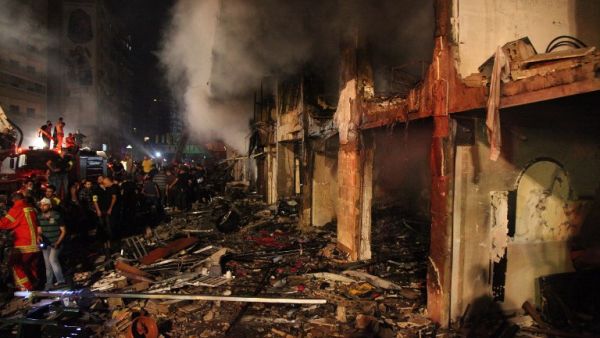BEIRUT: Hezbollah leader Sayyed Hasan Nasrallah accused Friday Jihadist groups fighting in Syria of being behind a string of attacks against his party in Lebanon and vowed to increase military involvement in the neighboring country in response.
He also warned that further bombings would pose a great threat to the country, saying: "If these bombings continue, Lebanon could be on the verge of the abyss."
“Up to this point, it has been shown, according to available information, that [the people behind recent attacks in Lebanon] belong to a certain Takfiri movement and their names and those behind them are known,” Nasrallah told crowds in the southern village of Aita Shaab, one kilometer from Israel’s border.
“They are, unfortunately, of Lebanese, Syrian and Palestinian nationalities,” he added.
Nasrallah was referring to several security incidents in Lebanon believed linked to the crisis in Syria, particularly Nasrallah’s announcement that his party is fighting alongside forces loyal to President Bashar Assad against rebels seeking the ouster of the Syrian leader.
He listed the incidents as the July roadside bombing that targeted a Hezbollah convoy in Hermel, east Lebanon, and several attacks on the southern suburbs of Beirut – the twin rocket attacks on Shiyah of May, the Bir al-Abed car bombing of July and Thursday’s car bombing in Ruwaiss.
At least 24 people were killed and over 300 were wounded in the latter incident which also led to extensive material damage.
Nasrallah, whose address was broadcast on a large screen, spoke on the occasion of the seventh anniversary of the July-August 2006 war between Lebanon and Israel.
He described the events in Ruwaiss as a “terrorist massacre” and denied that a Hezbollah official or center had been targeted. While he could not confirm if a suicide bomber had been behind the attack, he said the blast resulted from the detonation of “over 100 kilograms” of explosives.
Although he eliminated Israel as a prime suspect in the series of attacks in the country, he said U.S. and Israeli intelligence agencies had “undoubtedly” managed to infiltrate the jihadist groups, which he said were now working in the interests of the Jewish state.
He also said his party and Lebanese authorities had prior intelligence of car bombings planned for Beirut’s southern suburbs and “the most likely [suspects] are these groups, based on all available facts.”
Hours before Nasrallah’s speech, caretaker Defense Minister Fayez Ghosn revealed that a Syrian suspect was in custody over the Bir al-Abed car bombing.
Ghosn said authorities had also detained a man who confessed to being involved in planning to carry out car bombings in Beirut’s southern suburbs and other parts of the country.
Hezbollah has upped its security in its strongholds as “precautionary measures,” Nasrallah said.
“Such measures could reduce the occurrence of attacks and the damage but are not enough,” said Nasrallah, who proposed preventative measures to crackdown on Takfiri groups operating in Lebanon.
“[We should] work on uncovering, besieging, dismantling, arresting, and abolishing these groups and these are merely standard measures practiced in every country,” he said.
Nasrallah added that Takfiri groups should not enjoy “political cover, security and political protection.”
“Sectarian and confessional incitement should come to an end and our political conflicts should remain political,” Nasrallah said.
The Hezbollah chief urged Lebanese, particularly Shiites, to exert self-restraint and refrain from being dragged into sectarian strife, saying: “This requires awareness, patience, wisdom and tolerance.”
“What we fear is the main goal of these murderers: to evoke fiery, emotional, irresponsible reactions that could lead to strife and the destruction of the country,” he said, adding that the Takfiri groups were ruthless and did not represent the Sunni community.
“Any irresponsible act will lead to dangerous and bloody results,” he said.
Addressing the Takfiri groups, which he accused of indiscriminate brutality against the people in Syria, Nasrallah said: “I say to you that if you work for Israel, we know who you are and our hands will reach you if the state neglects [its tasks].”
"We are not an alternative to the state but every time the state fails to shoulder its responsibility, we will shoulder that responsibility,” he added.
The Hezbollah leader, who maintained that his involvement in Syria alongside regime forces was still limited, said attacks against the party would not change the party’s stance in support of President Bashar Assad.
“If you think that by killing our women, children and the innocent people and destroying our neighborhoods we will back down or change our stance then you are mistaken,” he said.
“You idiots: read our 30-year experience with Israel well,” Nasrallah said.
He said Hezbollah’s retaliation for the attacks in Lebanon would be to increase the party’s involvement in Syria.
“Our response to any [future] bombing will be this: If there are 100 fighters in Syria, they will be 200. If there is 1,000, there will be 2,000 ... you are striking in the wrong place,” Nasrallah warned.
“If the battle with those terrorists requires me and all of Hezbollah to head to Syria, we will, for the sake of Syria, Lebanon, and the Palestinian cause which is the central issue,” he added, vowing that his party would emerge victorious against the jihadists.








